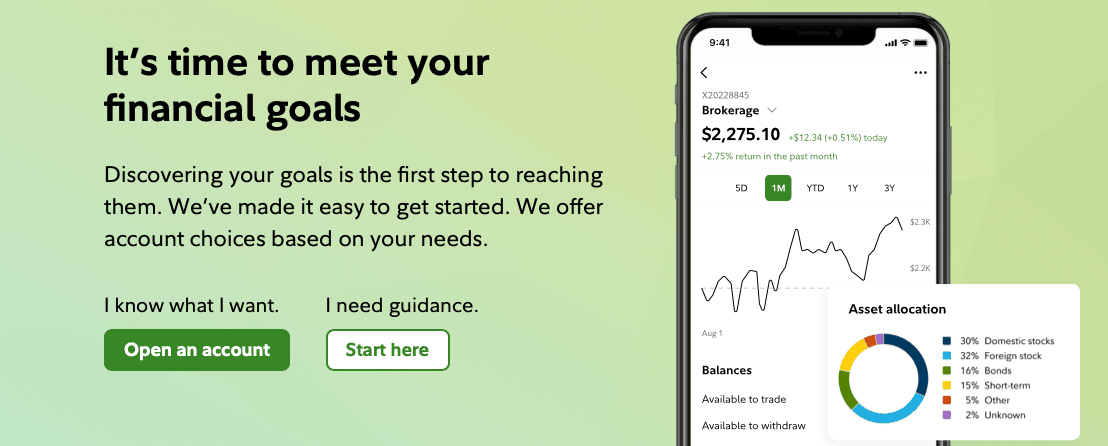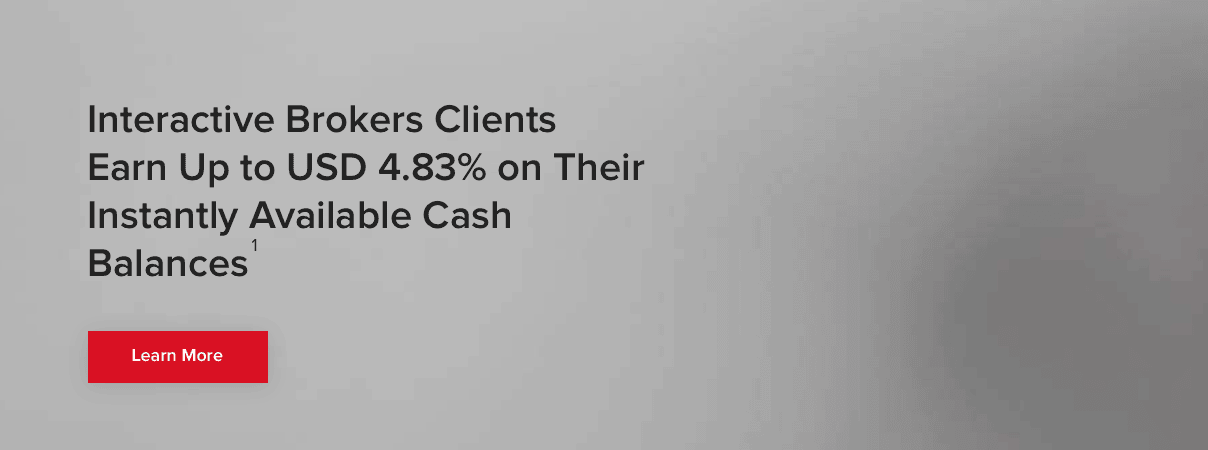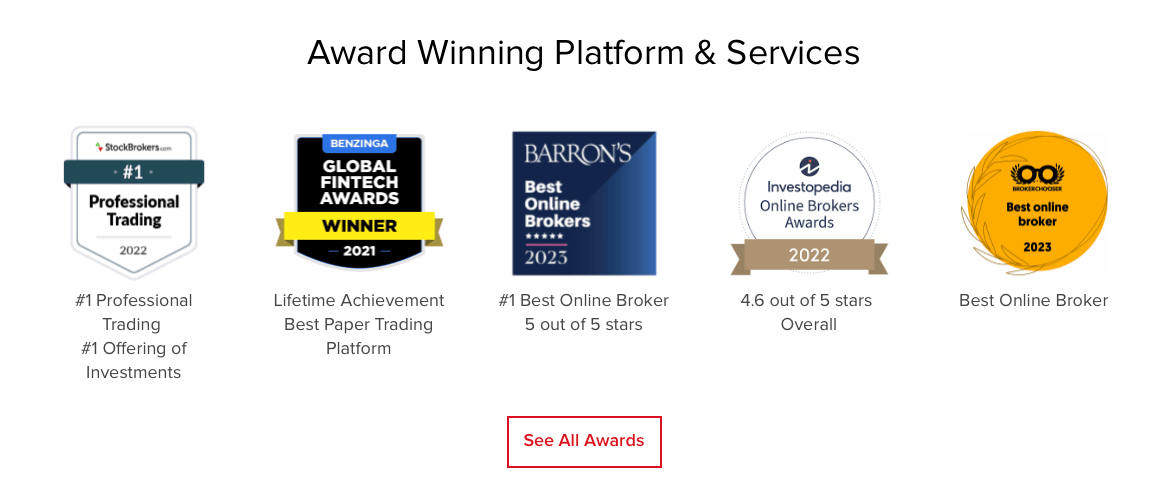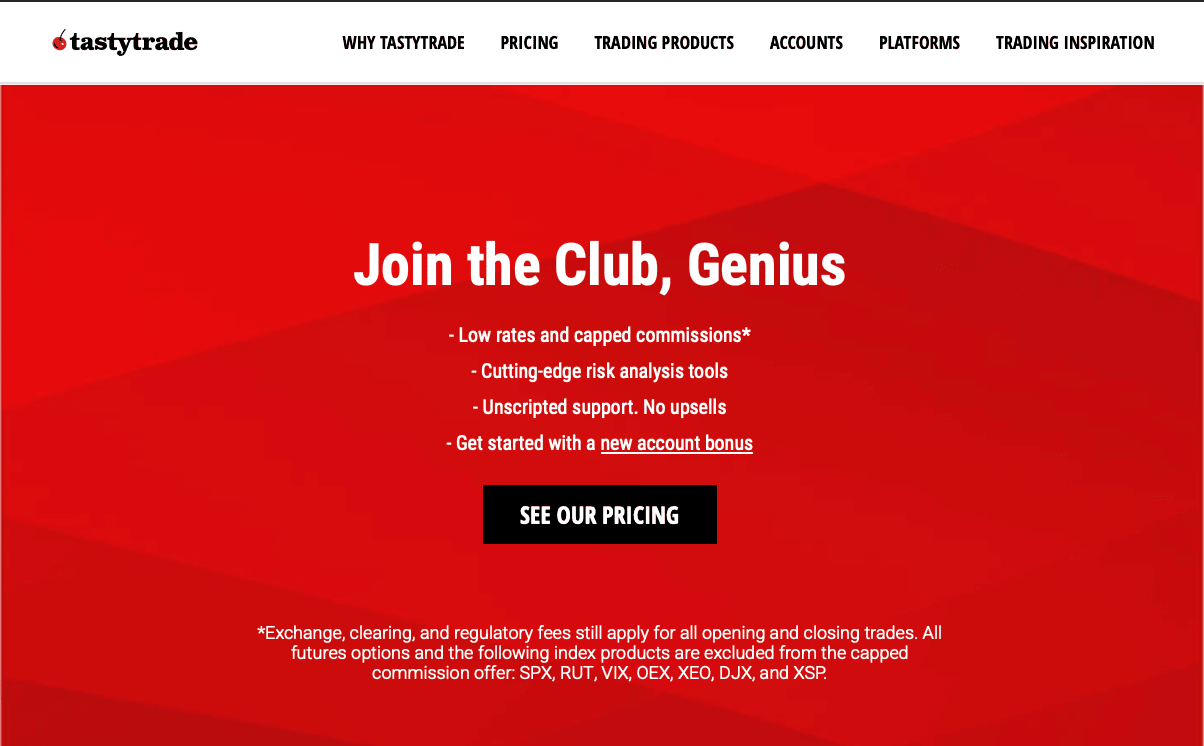Throughout history, financial markets have exhibited cycles of growth and decline, creating opportunities for investors to grow their wealth.
An essential step in capitalizing on these opportunities is selecting the right online broker that aligns with your financial objectives and preferences.
In today’s landscape, major online brokers have adopted commission-free trading for stocks and ETFs, and many have extended this to other asset classes.
The ideal trading platforms prioritize transparent fee structures, avoiding gamification tactics that encourage excessive trading.
They also offer robust fundamental and technical research, a diverse array of investment choices, advanced trading tools, exceptional customer support, mobile accessibility, and a wealth of educational resources, all accessible through powerful desktop and mobile interfaces.
What you'll learn:
1️⃣ Fidelity Investments (Best Overall Broker)
Fidelity stands as our top selection overall, excelling as the Best Low-Cost Broker and Best Broker for ETFs.
This accolade stems from its relentless commitment to enhancing products, robust customer support, unparalleled value, and its wealth of research and educational resources.
Fidelity’s illustrious journey commenced in 1946, and with $3.6 trillion in discretionary assets as of December 2022, it ranks among the titans of brokerage firms based on assets under management, headquartered in Boston.
| ❓Best for: | ✅ Pros: | ❌Cons: |
|---|---|---|
| Investors seeking a cost-effective, comprehensive broker. | Dedication to eliminating common account charges | Slightly higher fees for broker-assisted trades |
| Institutional and retail purposes. | Robust portfolio analysis and account features | Specific minimum balances for some index trading |
| Excellent choice for those interested in ETF trading. | Exceptional order execution | May require multiple platforms to access all available tools |
| Account Minimum: $0.00 | Robust Active Trader Pro platform | |
| Fees: $0.00 for equities/ETFs. $0.65 per contract for options. Futures $2.25 per contract. | Direct indexing | |
| Access to fractional shares trading in over 7,000 U.S. stocks |
Eager to elevate its offerings, Fidelity made significant strides in 2022. It introduced the Digital Assets Account (DAA), opening avenues for plan sponsors to provide participants access to Bitcoin as a core plan investment option.
Alongside this, Fidelity unveiled the Fidelity Crypto Industry and Digital Payments ETF (FDIG) and the Fidelity Metaverse ETF (FMET). The institutional realm also witnessed enhancements with broader access to proprietary tools, exemplified by the Fidelity Bond Beacon.
For investors seeking personalized guidance, Fidelity expanded its repertoire with digital direct indexing accounts, aptly named Fidelity Managed FidFolios.
Leveraging fractional shares, these FidFolios replicate indexes through actual stock ownership, allowing for deeper customization.
Further enhancements extended to the mobile experience, featuring a revamped app dashboard showcasing streaming quotes on the home screen and enhanced news feed customization.

After intense competition over the years, Fidelity clinched the title of the best broker for ETFs, surpassing Charles Schwab.
Fidelity shares a common ground with Schwab by offering a wealth of ETF-focused educational content, formidable ETF screening tools, and an extensive array of ETF choices. However, Fidelity’s edge came from its facilitation of fractional share trading in ETFs.
Fidelity’s history as a trailblazer in fee reduction is well-documented, and it upholds its reputation as a low-cost, high-value broker supported by an extensive customer service network.
For investors in pursuit of an online broker that balances cost-effectiveness with exceptional value, Fidelity stands as an unparalleled choice.
2️⃣ Interactive Brokers (Best Broker for International Traders)
Interactive Brokers stands out as the premier choice for sophisticated and international traders, uniquely combining a vast array of investable global assets, advanced trading technology, and robust research capabilities.
With 2.01 million client accounts and daily trade values of $1.92 million, IBKR maintains a stable and well-capitalized position while being publicly traded.
| ❓Best for: | ✅Pros: | ❌Cons: |
|---|---|---|
| Sophisticated traders | Exceptional order execution | IBKR’s SmartRouting not available to IBKR Lite clients |
| International traders | Comprehensive range of contingent orders | Learning curve for Trader Workstation (TWS) can be steep |
| Account Minimum: $0.00 | Extensive selection of domestic and foreign assets | Lack of support for backtesting custom trading algorithms |
| Fees: Varies by account type and trading activity | Competitive low-margin interest rates | IBKR’s fee-based pricing structure can be somewhat intricate |
| Powerful Trader Workstation (TWS) |
Founded in 1978 by its current chairman, Thomas Peterffy, initially known as T.P. & Co., the company revolutionized trading through computer technology. It officially became Interactive Brokers Inc., a U.S. broker-dealer, in 1993.
Today, it ranks among the most comprehensive brokers in the industry. With access to 150 markets and the ability to trade stocks, options, futures, currencies, bonds, funds, crypto, and more across over 200 countries, alongside funding options in 26 currencies, IBKR stands as the unrivaled international broker.

Continual innovation is IBKR’s strategy to maintain a substantial lead over competitors. Recent significant improvements include offering market rate interest on uninvested cash, introducing the IBKR GlobalTrader mobile app, and enabling fractional shares trading for European shares and ETFs.
International traders enjoy seamless access to financial markets and all assets through desktop, web, and mobile platforms, including IBKR Mobile and the IBKR GlobalTrader app.

The Trader Workstation (TWS) stands as a brilliantly designed platform that seamlessly integrates technical analysis, social sentiment analysis, fundamental research, and financial calculators.
This integration equips users to exploit price inefficiencies more effectively than any other reviewed platform.
3️⃣ Tastytrade (Best Broker for Options)
Tastytrade remains the top choice for options trading due to its exceptional blend of options-centric tools and content.
Originally introduced as tastyworks by tastytrade in 2017, this platform was crafted by the same team behind TD Ameritrade’s highly acclaimed thinkorswim® application.
| ❓Best for: | ✅Pros: | ❌Cons: |
|---|---|---|
| High-volume/High-frequency option traders | Capped Commission Structure for Options | Limited Investment Options |
| Account Minimum: $0 | Exceptional Tools for Analyzing and Monitoring Options Trades | Few Investing and Retirement Resources |
| Fees & Commissions: $0 stock trades $1 to open options trades (capped at $10 per leg), $0 to close | Superb Options-Specific Content and Educational Material | Weak Portfolio Analytics |
| Recent Dashboard Improvements | No News or Fundamental Analysis | |
| Follow Feed Feature |
Tastytrade offers highly competitive fees for options trading, featuring commission caps for larger lot sizes and zero commissions for position closures.
Importantly, these low fees do not sacrifice quality, as the platform provides robust options analytics, efficient workflow, and rapid trade execution, earning it a prominent position among the platforms we evaluated.

Responding to user demands, tastytrade incorporates social trading capabilities that permit real-time tracking of individual traders and the replication of their strategies.
While the platform maintains stellar customer support, a capped fee structure for options trading, and excellent options-focused educational content, our updated evaluation dings it for lacking essential research features and limited mobile charting capabilities.
The company has indicated efforts to address these issues, but they come too late to prevent tastytrade from claiming the titles of Best Broker for Advanced Options Traders and Best Broker for Mobile Options Traders from Interactive Brokers and TD Ameritrade, respectively.
➤ Best Online Brokers: Final thoughts
In 2022, a new breed of traders learned a valuable lesson: markets can undergo significant bouts of high volatility as the Federal Reserve shifted its focus from fueling post-COVID growth to combating elevated inflation.
While all online brokers profit from the trading activities of their clients, either directly or indirectly, the finest brokerage platforms distinguish themselves by offering robust customer support, comprehensive research and analytical tools, extensive educational resources, a diverse range of tradable assets, and an array of account options.
Moreover, they maintain a transparent fee structure while minimizing gamification tactics.
After an exhaustive assessment of the leading online brokers, we’ve determined that Fidelity stands out not only for its excellence in ETF investing and cost-effectiveness but as the ultimate all-around brokerage.
TD Ameritrade impresses both novices and experienced investors with its advanced yet user-friendly trading platform, extensive resources, and top-tier mobile experience.
Tastytrade boasts an intuitive platform suitable for newcomers, backed by unparalleled educational content and market insights, particularly for those focusing on options trading.
For traders ready to embrace the pinnacle of advanced platforms with access to the widest array of international markets, Interactive Brokers provides an unparalleled experience.
➤ Best Online Brokers FAQ
How to select an online broker
When deciding on an online broker, your immediate needs as an investor or trader should be your primary consideration. If you’re a beginner, you’ll benefit from a broker with robust educational resources on financial markets, making TD Ameritrade an ideal choice for novices.
Several brokers also offer paper trading before funding an account, allowing you to learn the platform, explore available assets, and practice trading without risking real capital.
What’s an online broker?
A brokerage account functions similarly to your bank accounts, enabling you to deposit funds with an investment firm, or brokerage. Typically, this is done through a transfer from your existing bank account.
After funding your brokerage account, you can utilize the broker’s trading platform to invest these funds in the market. The assets you purchase with your capital can encompass a wide range of offerings provided by the brokerage, including stocks, bonds, ETFs, and even cryptocurrencies.
Your online brokerage account will display your holdings (the assets you’ve acquired) along with your cash balance (representing your buying power). When you invest in assets that appreciate in value, you can sell them, and the resulting profits will be credited to your online brokerage account.
Subsequently, you can execute additional trades or transfer the funds to your standard bank account for other purposes. Some brokerage accounts even offer the opportunity to earn interest on your uninvested cash.
How much money do I need to start trading?
There’s no longer a set minimum capital requirement to initiate investments in financial markets. With many brokers offering accounts without obligatory minimums and granting access to fractional shares, you can commence investing with any sum of money.
Nevertheless, if you have limited capital to invest, your approach to the market may be influenced.
While you can invest as little as $1 in fractional shares of a specific stock, it’s advisable to consider utilizing ETFs when dealing with limited capital. ETFs, particularly those tracking market indices, offer superior diversification for your investment, as each share (including fractional shares) replicates an index composed of multiple companies spanning various industries.
You may also contemplate employing options to leverage your capital for directional market or stock bets; however, this strategy is best suited for risk capital rather than your entire investment fund.With modest investments, consistency is the cornerstone of wealth accumulation.
Regularly allocating a fixed sum of money to the market, even as low as $10 per week, can lead to surprisingly rapid growth. Consistency also helps mitigate the effects of market volatility by enabling you to buy during market dips and peaks.
Can I trade with little money?
Numerous online brokers accommodate small minimum deposits, making them an attractive option for those with restricted financial resources.
Account minimums, if applicable, are displayed at the top of our reviews and in our selection of the best platforms tailored to various investor types. If you seek broader guidance on investing with limited capital, consult our article on intelligent investing on a tight budget.
Are there mobile platforms for trading?
Certain online brokers provide exceptional mobile applications that offer nearly all the features found in their desktop counterparts. For instance, options traders will appreciate that the tastytrade app streamlines the robust tastytrade desktop platform.
TD Ameritrade customers can choose between the comprehensive thinkorswim mobile app designed for active traders and the standard TD Ameritrade app designed for less active investors, with each app tailored to its intended user.
Can I lose money trading?
Yes, it is indeed possible. In the financial markets, rewards invariably entail risk. You can incur losses by investing in underperforming assets or by mistiming the purchase of high-potential assets. In the realm of financial markets, countless opportunities exist for both profit and loss.
Unless your brokerage account contains only uninvested cash, there is a risk of incurring losses. Alternatively, an account brimming with uninvested cash carries no potential for profit.
Strategies like asset allocation and diversification can mitigate the risk of loss, although complete elimination is improbable without also forfeiting the possibility of generating substantial returns.
Do I need an online broker to buy stocks?
Yes, it is feasible to purchase stocks without a broker, although this approach is less common nowadays.
Certain companies still offer direct stock purchase plans, allowing you to buy shares directly from the company. These plans are administered according to internal rules, and some may only be accessible to company employees.
To ascertain whether a direct stock purchase plan is offered by a company and to understand its terms and conditions, you must contact the company directly.
Although such plans once enabled investors to avoid brokerage fees, the proliferation of online discount brokers offering commission-free trading has rendered these plans somewhat obsolete.
Is there a difference between investing and trading?
It’s important to differentiate between investing and trading. Typically, investing involves acquiring assets with the intention of holding them for an extended period, often to gradually accumulate wealth and achieve long-term financial goals, such as retirement.
Conversely, trading entails implementing short-term strategies designed to maximize returns over brief periods, such as daily or monthly intervals.
Trading is generally considered to carry greater risk compared to investing. All these factors should be carefully considered before selecting an online broker.
Are you inclined to trade or invest? Do you require a robust mobile app to monitor your portfolio on the go? What types of assets do you intend to invest in?
These questions may not always yield straightforward answers. For further assistance in choosing a broker, consult our guide on selecting a stock broker. Once you’ve made a decision, you can also refer to our guide on opening a brokerage account for further guidance.



